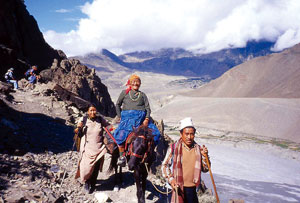 |
Travel medicine is usually thought of as prevention and treatment of diseases in Westerners who come as tourists to the developing world and fall ill. In reality though, travel medicine is more than just preventive measures and treatment of traveller's diarrhoea.
For example, post- travel assessment of problems in a traveller is clearly more interesting for clinicians as it requires certain sophisticated knowledge of infectious diseases in the geographical area that was visited. And there are certain vulnerable groups called VFRs (visiting friends and relatives) who were born and lived in places like Nepal for many years, but are now permanently settled in a Western country. Amazingly, this group is notorious for falling sick during or after their visit to their native countries.
Experts hypothesise that VFRs immunity to common infectious diseases like gastroenteritis and typhoid wanes after a long stay in the West. Hence the predisposition to problems. More importantly he or she may not be properly vaccinated unlike other regular, non- VFR tourists against prevalent diseases here. Some even drink Kathmandu's contaminated tap water trying to perhaps prove that they are true sons and daughters of the soil. This is "going native" in a big way. Being sick during vacation is no fun for either the guest or the host. Furthermore, some become sick and are hospitalised with diseases like typhoid fever on return to their adopted country and are presented as cautionary tales on medical rounds in Western hospitals. This is a bit embarrassing, as a physician who migrated from Nepal found out after visiting his birthplace (without taking health precautions) during Dasain and fell sick with typhoid on his return.
So if you have Nepali friends and relatives settled in developed countries wishing to visit you, it's essential to recommend them to visit local travel clinics in their home towns for advice or look up websites of organisations like the Centres for Disease Control (CDC) or WHO for vaccinations and other precautions they should take before flying to Nepal.
Another important point is that busy clinicians in Nepal hardly ever obtain travel history from their patients. With Nepalis being more mobile (labour migrants, for example) than ever before, keeping a travel history is important. So if you travel to Africa and come down with flu-like illness, you probably have the dangerous kind of malaria unless proven otherwise. You might have to tell your doctor of your recent visit to Africa regardless of whether the doctor asks you or not.


